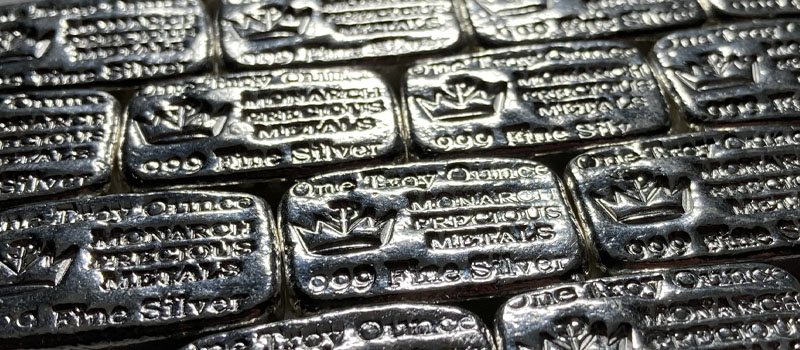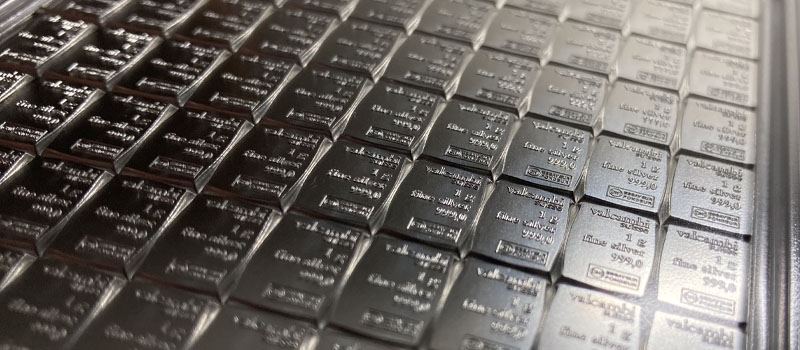At PIMBEX, we’re here to help, and we always love speaking with our customers. Every day we’re asked exciting questions about precious metals, and lately, silver has been the hot topic.
Talking metals is our favorite pastime, and we’re never one to hold back knowledge. So, we figured now would be a good time to cover the most common questions we’ve received about silver bullion investing.
Alright, let’s get started.
Silver Bullion Investing: Question & Answer
How is the price of silver determined?
The silver spot price is derived from commodities traders buying and selling silver futures contracts on the Commodities Exchange (COMEX). Futures contracts are issued year-round, but the front-month or the nearest expiring contract is the quoted silver spot price we track every day. It sounds complicated, but it’s merely large companies hedging their silver inventory or raw material by locking in the silver price and securing their profit margin. Speculators, who anticipate silver price to move in the opposite direction from the hedger's bet, take the opposing side of the trade.
Why is the price for a silver coin more than the spot price of silver?
The unfortunate reality is that nobody pays just the spot price for silver bullion, but once you understand how the industry operates, it starts to make more sense. The silver spot price is the starting point for most fabricators (mints, jewelers, etc.) who buy silver in bulk quantities, and even they pay delivery fees for their pallets of 1000oz bars. Fabricators then expend time and energy converting these commercial silver bars into smaller retail investments, jewelry, etc.
With this in mind, it becomes clear why dealers charge a premium on bullion investments. Luckily PIMBEX has some of the lowest bullion prices online, helping everyone protect their hard-earned savings for the lowest possible dollar cost average.
What is the best silver to buy?
That depends on your goals. Are you looking for the lowest possible cost per ounce? Do you want divisibility and flexibility in your holdings? Do you have an exit plan? When we take everything into account, it’s impossible to ignore the factors associated with the eventual sale of your silver bullion. In our opinion, it’s wise to start with sovereign coins from your national mint. This option provides a divisible and recognizable retail silver investment that makes selling straightforward. These coins and smaller bars are more expensive per piece, and you can always shift your focus to larger bars (10oz, kilos, and 100oz) to achieve the lowest silver price per ounce.

Can I resell my silver down the road?
Absolutely. Local coin shops and pawn dealers buy silver coins and bullion; just be sure to call around for a few quotes. Local shops are usually the fastest way to liquidate silver or gold investments, but they don’t typically offer the most money. PIMBEX buys back every product we sell, even gold and silver products not listed on the website. We do offer top dollar, so if you’re in the market to sell your silver, please reach out for a quote.
How do I keep my silver bullion safe?
There are a few considerations when safeguarding your silver coins and bars. Theft is the biggest threat precious metals investors face, and selecting an excellent storage place is crucial. A big safe or a perfect hiding spot are the first two storage options that come to mind. It’s also important to remember that silver is susceptible to tarnish, which can impact resale value. To lower the chance of any tarnish or “milk spots,” it’s wise to store silver in a dry, cool place. Check out our article on safe bullion storage for all the details.
How can I tell if my jewelry has silver in it? How much silver is in my jewelry?
If you have a piece of jewelry made from a white, lustrous metal but aren’t sure its metal content, check for a purity marking. If you find a stamp of “925” or the profile of a lion, or plain “sterling,” then it’s silver. Most silver jewelry is sterling or 92.5% silver by weight, with the remainder usually copper to provide surface durability. If there is no marking, try running a magnet over the jewelry to see if there’s any reaction. Silver doesn’t stick to magnets, but it’s probably not pure silver if your jewelry does. If you’re still unsure, take it to a local coin shop or pawn broker, and they will be able to administer tests to determine the metal content.
My silver coins are dirty, how do you clean them?
Constitutional or “Junk” silver coins haven’t been minted in over 50 years and were circulating money at one point. They tend to show their age, and when we acquire them, the first reaction might be to make them “look pretty.” Of course, they’re your silver coins, but we recommend against this course of action as it can decrease their desirability on the secondary market.
Old junk silver coins, even common dates, have a certain collector appeal, and removing that natural patina can make other investors shy away when you want to sell. Modern bullion, especially bars and rounds, are only traded for their metal content, and cleaning them presents less of an issue. Additionally, jewelry and silverware serve a decorative purpose, and cleaning them won’t affect their resale value adversely.

Are there taxes when I buy silver bullion?
Depending on your state, there could be an applicable sales tax associated with gold, silver, platinum, or palladium bullion. Many states also have special rules or exemptions for retail bullion sales. For instance, if you buy over $1,500 of silver in a single purchase in California, there is no sales tax. There's a similar $1,000 sales tax threshold in New York state. We've assembled a detailed, state-by-state bullion tax guide bullion tax guide to assist.
Are there taxes when I sell silver bullion?
Silver and other precious metals are classified as “collectibles” for tax purposes. If you sell your silver for a price higher than what you paid for it, the IRS considers it a gain taxable up to 28%. Certain transactions are reportable to the IRS, generally when selling larger bullion quantities, requiring PIMBEX to file a Form 1099-B with the IRS. We suggest consulting with your tax professional to determine any tax liability on your silver bullion sales.
How do you know your silver is really silver?
At PIMBEX, we only source from trusted suppliers, and we also test everything in-house using professional-grade equipment. We guarantee product authenticity and will always buy back any metal we sell.
Is silver magnetic?
As was mentioned previously, pure silver is not magnetic in that it will not directly stick to a magnet. But silver exhibits weak magnetic properties and will react when brought in close contact with a magnet. Silver is considered “diamagnetic,” which means any magnetic field weakly repels it. If you have a strong magnet, place a silver bar at an angle and let the magnet slide down the silver bar’s face. You’ll notice a dramatic slowing of the magnet as it moves over the surface of the pure silver bar. It’s an interesting, low-tech way to test your silver and a fun experiment to show the family!
